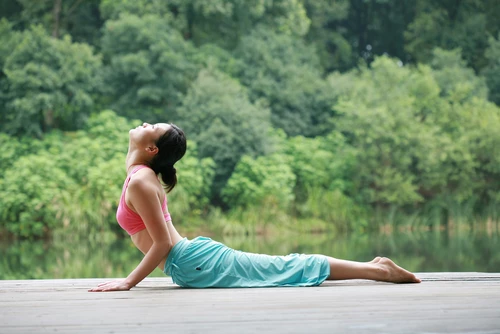Study: Yoga May Be Good News for Couch Potatoes

According to a recent study, yoga may offer some good news for couch potatoes looking to kick the habit.
For a couch potato there is nothing more pleasing than to recline comfortably and let life just flow on by, preferably with a little entertainment. With today’s 24-hour entertainment and mostly sedentary jobs, it’s easer than ever to get in touch with our inner couch potato.
Unfortunately, while all that R&R on your couch may feel good, it isn’t just bad for your well-being; our national preference for all things sedentary has created a huge national health problem.
Health conditions arising from inactivity account for 1 trillion in U.S. health care costs and 250,000 premature deaths each year, according to research. The illnesses caused by or complicated by inactivity include cardiovascular disease, high blood pressure, obesity, diabetes, anxiety, depression, certain cancers, and bone, muscle and joint deterioration.
Unfortunately, the more out of shape we get, the harder it is to get back, well, on our feet. We all know that exercise can improve life in numerous ways, but how do they get motivated to do it? Well, according to a recent study in Alternative Therapies in Health and Medicine, for couch potatoes looking to kick the habit, yoga may offer some good news.
The study included 27 adults with an average age of 51, who had been inactive for at least six months before the study. One group was assigned to one-hour yoga sessions twice a week for ten weeks, while another group continued with their usual lifestyle. After six months, the yoga participants had improved significantly compared to controls. They were more likely to adhere to exercise routines, they engaged in more activity outside of class, and they became more self-motivated and self-sufficient when it came to engaging in physical activity.
Most significantly, the people in the yoga group were able to stick with their yoga practice, even though they before had never succeeded in taking up other physical activity programs. The yoga practitioners also reported that they were able to manage stress better and had improved their eating habits.
When asked why they had been able to stick with their yoga practice, participants in the yoga group said that yoga made them feel enthusiastic, peaceful, happy, upbeat, and revived. The control group, meanwhile, didn’t just stay at the same level, but declined in measures of happiness, self-efficacy and exercise adherence.
In short, the researchers concluded, yoga may just offer some hope for even the most intractable couch potato.
And, great credit is due to those who dare try. Those of us who have been there know that to get off the couch and start exercising is an act of courage when you know that 1) you don’t look so good, 2) you can’t move as well as others in the class due to stiffness, obesity or clumsiness and 3) you may have chosen the couch in the first place because of discouragement, chronic fatigue, depression or other debilitating energy-zappers.
For those coming from a sedentary lifestyle, practicing yoga is easier to feel confident about, because the right teacher will remind you that yoga is all about process, and not about results. Yoga is not about achievement, awards, comparisons or competitions. Yoga is about being present in the moment, tuning in to mind and body, and connecting with those deeper inner resources we all have, regardless of age, shape or fitness level.
Source
The effects of yoga on psychosocial variables and exercise adherence: a randomized, controlled pilot study.
Bryan S, et.al. St. Peter’s University, Jersey City, NJ, USA.



